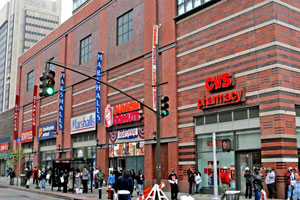
NEW YORK (FinalCall.com) – Activists and Harlem residents heeded the call from Nellie Bailey, executive director of the Harlem Tenants Council, and packed room 8A, on the eighth floor of the Harlem State Office Building, on Apr. 22, to join in the roundtable discussion, “Harlem from Black Mecca to Private Market: Will Blacks still be able to live in Harlem?”
“There is no question that poor, working-class Blacks are being forced out of Harlem,” argued Ms. Bailey during her opening remarks. She told the audience that people had to organize to contest the onslaught of gentrification. “We must organize ourselves into a political force, or we will be driven out of Harlem.”
The moderator for the evening was journalist Gil Noble, the host of the popular WABC television news magazine, “Like It Is.”
“I am as upset about what is happening in Harlem as you are,” said Mr. Noble, who revealed that he was born and raised in Harlem.
The panel included Professor Robin D.G. Kelly of Columbia University; Lionel McIntyre, associate professor in the Practice of Community Development, and director of the Urban Technical Assistance Project of Columbia University; labor activist Brenda Stokley, president of DC 1707 of the American Federation of State, County and Municipal Employees; and political economist John Rynn, author of “The Power to Create Wealth.”
“Clearly, Harlem is not the Mecca today,” Prof. Kelly said. He read a line from a 1925 poem by James Weldon Johnson: “Are the Negroes going to be able to hold Harlem?” Mr. Kelly then said that Big Capital was planning to turn Harlem into a private capital reserve.
Prof. Kelly contended that, while low-wage jobs had been created, Blacks were being pushed out of ownership of businesses and losing their private property. The connection to it all, according to Prof. Kelly, is the political machine, which has ties to the big business bosses in New York City. He further argued that, because of the decisions made at City Hall and the capital in Albany, N.Y., allowing absentee landlords to cash in on the housing boom, low-wage earning Blacks were being driven out of Harlem. “But they can shop here,” he pointed out.
John Rynn explained how the country’s economy affected Harlem. “The U.S. is in trouble because we have lost our manufacturing base, and that is creating a national housing bubble,” he said.
Because of the low value of the dollar, he continued, speculators have invested their money in housing, noting that housing in Manhattan is very costly.
“I pay $2,500 for a two-bedroom apartment on the upper West Side at 96th St., and 20 blocks below me people are paying $3,600 for two-bedrooms. People in New York City are earning less and need to find affordable housing, and they are looking to Harlem,” Mr. Rynn said, adding that Whites are moving to Harlem in record numbers because rents are affordable for them, while Blacks are being priced out of the local housing market.
“Fifteen years ago, when they were creating the Empowerment Zone program, it was designed to capture all city-owned property in Harlem,” explained Prof. McIntyre. “I created the structure of the Empowerment Zone,” he admitted. He was working at the now-defunct Harlem Urban Development Corporation (HUDC), which created the bottom-up plan for maximum participation of the people of Harlem in the decision-making process for the development of their community.
“We wrote a plan with the input of at least 3,000 Harlem residents, and the people downtown backed a dumpster up to the office and sent all of our work to the city dump,” Prof. McIntyre stressed. “The newspapers said that HUDC spent $25 million and produced no plan for Harlem.”
He said the city and state have not protected the rights of the everyday citizens in Harlem. “We have to get back to where government works for the public good,” he insisted.
Ms. Stokley, also born and raised in Harlem, brought the audience to their feet when she implored residents to organize and demand that politicians and corporations heed the demands of the people that now call Harlem their home. “Our struggle is a question of will, a question of changing the power relationship in this city,” Ms. Stokley said, maintaining that the demands from Harlem residents are not a dream.
“What is the real essence of community control?” she asked. “Organize a militant fight-back and go to the streets.”
When the moderator opened the floor to the audience, most of the questions centered on action.
“There was a degree of unanimity on the fact that we have to do something. Whatever it is, it has to be a collective action,” Ms. Bailey told The Final Call.
Dr. Linda Rock said that she was disappointed with the panelists because they offered no solutions. “We have been very much talk, talk, talk, and no solutions for too many years. That is why this is happening to us here in Harlem now. We’ve got to become solution-oriented,” Dr. Rock urged.












